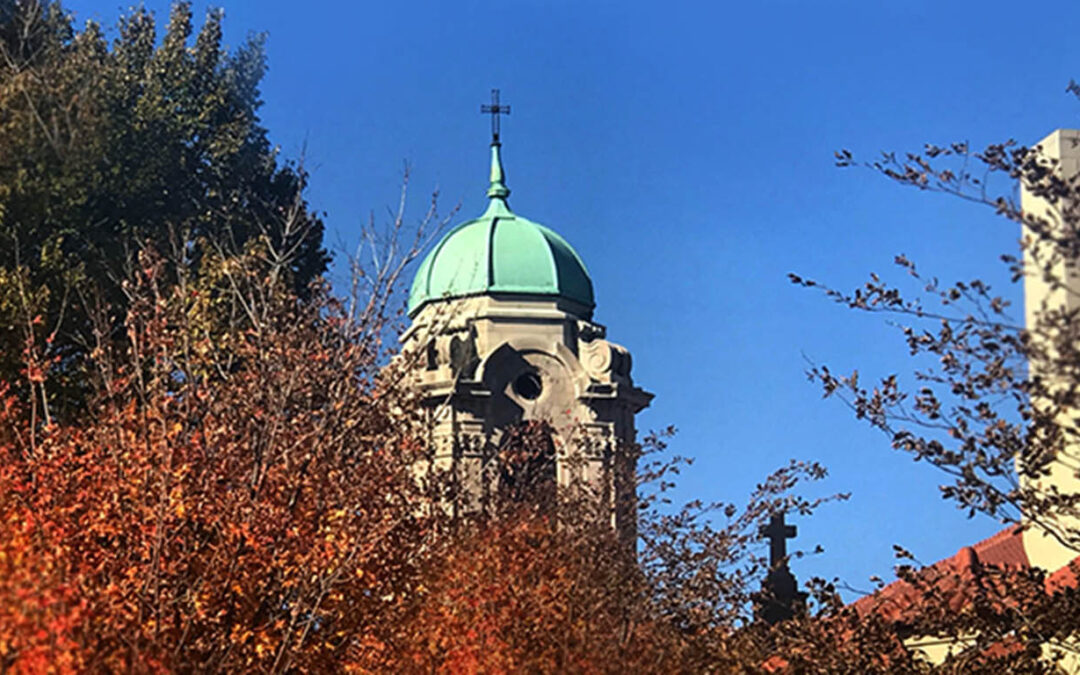Dear Friends,
This weekend, I am attempting to be in two places at the same time. I am serving as the Spiritual Director for the Women’s Christians Encounter Christ weekend. I am also going to try to be present for weekend activities at Cabrini such as the Spaghetti Dinner. I hope you all have a chance to join us for the dinner either in a role of service or by simply enjoying a great meal. Working together to benefit others is a great way to build community. Thanks for your work and for joining us for the feast.
The universal Church is celebrating the 60th anniversary of the opening of Vatican Council II. Those of you my age and older may remember those unique days when thousands of bishops gathered from all over the world to reflect on the Church herself and what God was calling her to do. Pope John XXIII had called the Council as an invitation to renewal and a recommitment to the work of Jesus in the modern world. The call for a Council came as quite a surprise to the American Catholic Church who, at the time, was experiencing great success. She had been a Church of mostly poor immigrants who were not afforded full participation in the American systems of power. The Church responded by creating the most effective educational system the world had ever seen. From kindergarten through graduate school, it was possible to be guided by and held by the Catholic Church’s school system. The result was that Catholics went from being a poor minority to a well-educated and wealthy minority in one generation. The Church in the United States saw no reason for a Council, she only saw her success. Colleges and seminaries were full. Parishes were booming. From the perspective of the United States, nothing in the Church needed to change.
The Church in Europe saw a great need for a Council. They had been asking for it. In the prior 50 years, they had seen two wars that tore their homelands apart. Millions of Catholics had died fighting other Catholics. Catholics had served as guards and killers in prison camps for people who were designated the enemy simply because of the religious faith they were born into. The Church in Europe had been asking themselves, “How is it possible? How could we have killed millions of our brothers and sisters? How could we have gone against the teaching of Jesus and killed those we were commanded to love?”
The Church in Europe was ready for a Council even if the Church in the US was surprised by it. The Church had to reflect on herself and make changes so that world wars would never happen again on Catholic soil.
At the opening session of the Council on October 12, 1962, Pope John XXIII said the following, “It is clearly evident that a Council is concerned primarily with the Catholic Church. Its purpose is to show the Church’s vigor and to emphasize its spiritual mission. It also aims to adapt its methods so that the Gospel teaching may be worthily lived and more readily heeded by the people…Finally, the Council wishes to show the world how to put into practice the teaching of the divine Founder, the Prince of Peace. Whoever conforms his life to this teaching helps to establish peace and to foster true prosperity.
Among men who would wish to recognize only the effects of physical force, the duty of the Church would be to reveal the full consequence and efficacy of the moral force of Christianity, which is a message entirely of truth, of justice and of charity. Such are the foundations on which the Pope must labor to establish a true peace; a peace directed toward the elevation of nations through respect for the human person and toward the procuring of a just freedom of religion and worship; a peace which nourishes harmony between nations – and there is no reason why this should not exist – even if it calls for some sacrifice on their part…Such is the great peace which all men await and for which they have suffered so much; it is time that decisive steps be taken. It is this very peace which the Church labors to establish: by prayer, by the deep respect she has for the unfortunate, the sick, the aged, and by the spreading of her doctrine which is the doctrine of brotherly love; for men are Brothers and – We say it from a full heart – all sons of the same Father. The Council will certainly help to prepare this new climate and to remove all conflict, particularly war, that scourge of nations, which today would be pointing toward the destruction of humanity.“
One of the ways the Church was changed by the Council was the call to the laity to embrace their own mission. The Church was not just a Church of the clergy. No. She was a Church of all believers and all were called into the mission of holiness. The laity now would have a much greater role than simply coming to Mass and putting money in the collection plate. The laity were called to serve and to have God’s power flow through them. Clerics had their unique role to play in the Church, but so did the laity.
True power was to be seen as the power of God flowing through us. Not the power of office, but the power of service. In this new topsy-turvy world of God’s kingdom, we lose strength by claiming dominion and are filled with strength when we allow the work of ministry to flow through us. Authority is not diminished by doing the work of mission, but is confirmed by it. God came in the person of Jesus to serve, not to be served. God’s power is present in that same service today.
Peace,
Fr. Damian



